It’s not only in Northern Ireland that the EU has taken to acting like some imperial power. Last week, with international correspondents’ eyes conveniently fixed on the G7, it quietly began a legal push to take over large areas of its remaining member states’ domestic affairs.
On Tuesday, the Commission announced that it was suing no less than seven of them in the Court of Justice for breaking EU law. Czechia and Poland are accused of not allowing EU citizens generally to join national political parties, and Hungary of not accepting migrants according to Brussels’s plans. The Netherlands, Greece and Lithuania are charged with failing to have severe enough laws against hate speech and Holocaust denial. Germany is in legal trouble for allowing its constitutional court to say that the German constitution, and not EU law, governs the expenditure of German taxpayers’ money (more on this later).
As if this was not enough, on Thursday the European parliament, in a bizarre twist, threatened legal action against the Commission itself. In these proceedings, which one suspects may be quietly welcomed by the Commission, it is asking the court to order a cut-off of all COVID financial relief from Poland and Hungary until they change their stance on gay rights, media pluralism and judicial independence.
If push comes to shove, most of these claims will probably succeed. But whatever the details of EU legislation, it is no secret that the European Court of Justice is a court with very sensitive political antennae despite its formal independence. It also has a record of fairly consistently supporting the centralization of power and jealously guarding the principle of the supremacy of EU law against all comers.
;768:[300×250,336×280,320×100];0:[300×250,320×100,320×50]”]It is hard to avoid seeing these developments as substantial and deliberate Euro-mission creep. Moreover, it is mission creep with a very distinct twist. It is coming to look increasingly like an attempt to reproduce America’s New Deal, where the federal government and the Supreme Court injected a large dose of federal law into what had previously been state matters.
Think for a moment about the subjects involved in the proceedings against the Netherlands and the central European states: immigration, civil rights, freedom of speech and public order, the judicial appointments process and electoral law. All concern functions traditionally central to the nation state.
This concerted push by the EU to take on traditional state functions reveals two related facts. First, by increasing the uniformity of rules throughout the bloc, the EU signals that it views itself as a federal state (like the US, Canada or Australia). Secondly, it sends a strong signal to member states that they should accept that they now exercise their powers essentially under the EU’s supervision — Brussels is the master now.
Of course, you might (and many progressives will) see in this the EU acting as a benevolent force, rather like the US government when it fought such evils as segregation through the federal Civil Rights Act. However, there is an important difference. The US federal government as a whole is a functioning democracy. The EU is not.
Just look at its largely complaisant parliament — unable to come up with any legislation of its own — where laws come from the bloc’s unelected civil servants at Commission and directed by behind-closed-door meetings of the Council. It follows that its recent initiative is not only an attempt to clip the wings of European nation states: it will also have the effect of removing important areas of social policy from the control of national voters. Immigration, electoral law and the running of national political parties are straightforward examples. The question of whether Holocaust denial should be a crime, traditionally a point of agreement to differ between European states with different traditions and histories, is another. Britain, for example, has no law against Holocaust denial.
;768:[300×250,336×280,320×100];0:[300×250,320×100,320×50]”]But there’s more. The most symbolic claim by the EU is that against the German state, and it merits a closer look. It all started with EU proposals to borrow €750 billion ($909 billion) to finance COVID recovery, a move that would potentially cost German taxpayers serious money, and which for drearily technical reasons is also of questionable EU legality. An organization called Bündnis Bürgerwille (Citizens’ Will Alliance) has taken up this point. It says that German taxpayers’ money can be spent only in so far as the German constitution permits it and that using it to bankroll Euro-projects is only permissible if they are actually lawful under EU law.
Ten weeks ago the German constitutional court agreed with the Alliance. It peremptorily ordered the German government not to sign up to the EU scheme. It then rubbed salt in the wound, stating that it had the final decision on such matters. Even if the European Court itself approved a scheme, this would make no difference, since within Germany the EU had only such power as was specifically given it by the German constitution, on which the German judges were the final and only arbiters.
The German position has the benefit of logic, and also of impeccable democratic virtue. The EU has nevertheless now resolved to attack it head-on. Its stance is that it has a legal power to sideline any constitutional rule in an EU member state, however fundamental or democratically embedded it may be. The political stakes are therefore sky-high.
If the EU court sides with the EU — and the smart money is on its doing exactly that — then there is every chance that the German constitutional court will simply not accept its ruling. In this clash of the irresistible force and the immovable object, the resulting inconceivable disturbance may well incidentally sweep aside much of the foundations of the EU.
We will have to wait some months to see what the European court decides on the matters announced last week. But whichever way its decisions go, one thing is clear. The fissures in the EU can only grow wider. At least this is a show Britain can now watch from the sidelines.
This article was originally published on The Spectator’s UK website.
;768:[300×250,336×280,320×100];0:[300×250,320×100,320×50]”]
























